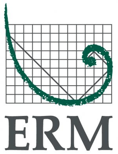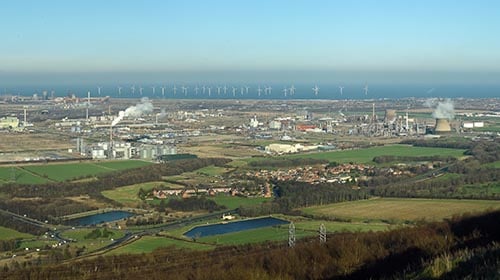Tackling climate change
Sustainability means better actions
A fundamental business challenge for every organization is to understand and manage the risks associated with climate change across its value chain, now and into the future. ERM works with clients to:
- Map carbon risk across all the activities and geographies in which the business operates;
- Verify and increase disclosure of current and future risks and opportunities to investors and other key stakeholders; and
- Develop and implement a plan of action to manage the risks and maximize business opportunities resulting from the transition to a lower-emissions future.
Forward-looking, scenario-based, climate risk management
The impacts of climate change are increasingly recognized as a material financial risk to businesses. This is requiring a greater focus on issues like the management of supply chains and physical assets that are becoming more important to investors. We partner with our clients and other organizations to understand the business implications of the Paris Agreement – and in what ways companies will need to contribute to a lower-emissions future.
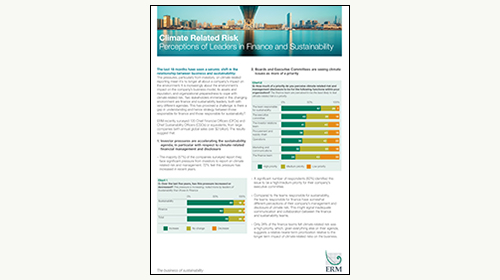
Climate change risk: the new investment fundamental
Most companies see the need to develop climate change strategies, but lack tools to share and report accurately. The finance function is lagging in awareness and prioritization of managing climate change risk.
We believe that to bridge the gap between sustainability and finance in addressing climate risk to their businesses, companies need to directly address changing investor pressures on climate change and provide greater comfort to capital markets. Read ERM's insights on how companies can bridge this gap in our report “Climate Change Risk: The New Investment Fundamental.”
ERM’s approach
ERM’s approach enables businesses to pursue forward-looking management of climate-related risks and opportunities. This not only helps satisfy investor and shareholder demands for transparency and disclosure, it empowers businesses to make more informed business risk decisions and implement more effective operational changes.
We have deep experience in evaluating transition and physical risk for many industries across a range of geographies, providing consistent technical advice in a business context with a unique and up-to-date perspective of the sustainability and climate change agenda. What sets ERM’s advice in this area apart is our ability to build on our deep technical expertise from working on these issues for more than 20 years, our strong understanding of societal expectations and our commercial acumen.
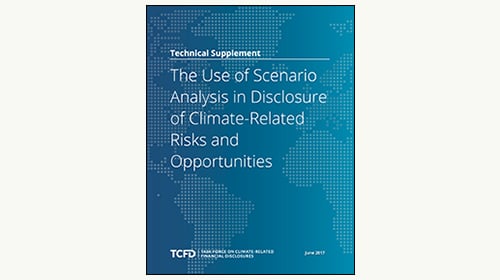
Task Force on Climate-related Financial Disclosures (TCFD)
ERM’s appointment was based upon our deep experience in evaluating transition and physical risk for many industries across a range of geographies. Mark Carney, Chair of the G20 Financial Stability Board and Governor of the Bank of England, commended TCFD’s recommendations for scenario-based disclosures as “ground-breaking innovation.”
The TCFD recommendations provide important guidance for companies and investors as they seek to understand how climate-related risks and opportunities may impact business and their financial performance into the future.
At the 2017 Bloomberg Sustainable Business Summits in London and New York, ERM Partner and technical supplement co-author James Stacey outlined how businesses can benefit from linking social and environmental risk to future business and financial planning. Learn more about ERM’s partnership with Bloomberg in the Society section of this report.
Supporting our clients
For many organizations, climate change will generate both risks and opportunities over the coming decades. Their timing and scale is uncertain, driven by policy, regulation, carbon pricing, technology, stakeholder and market sentiment, as well as physical climate change. Faced with this uncertainty, we believe scenario analysis is critical to developing a robust response to both challenges and opportunities.
ERM supports major companies – across a range of sectors – for which both policy and technology related “transition” risks and climate-related “physical” risks could have material financial implications.
ERM was the lead author of a groundbreaking approach for investors and businesses to assess climate financial risk – supporting the G20 Financial Stability Board’s Task Force on Climate-related Financial Disclosures (TCFD), which is chaired by Michael Bloomberg.
Assessing climate risk
ERM understands the risks and opportunities that the transition to a lower-emissions future presents for companies and investors alike. We have developed a robust scenarios-based approach built on a range of data sources, aligned to our advice to the TCFD, to assess and manage emerging risks and opportunities. Our methodology is adaptable to the client’s needs: holistic or events-based scenarios, top-down portfolio screening and bottom-up asset, value chain and company analysis, as appropriate.
We also work with asset owners, asset managers, and insurers to understand the impact of the carbon transition on their portfolios. For example, a key question for insurance companies is how to assess the materiality of transition risks across different infrastructure investments that will vary greatly by geography, sector and time horizon. As outlined by Mark Carney, the Chair of the Financial Stability Board, the risk of a disorderly transition to a lower-emissions economy could materially impact the global financial markets and hence the financial performance of insurers’ investments in infrastructure.1
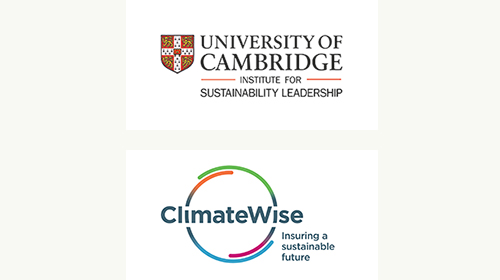
Assessing climate-related financial risk to infrastructure investments with ClimateWise
The project team developed a methodology to assess financial impact on investments over relevant timeframes. This framework provides investors and regulators with enhanced understanding of how these risks drive financial performance. The focus of the framework is on financial results: providing insight into how various assets’ revenue and costs could be impacted and what options are available to minimize exposure.
This unique framework supports the quantification of climate-related financial risk recommended by the Task Force on Climate-related Financial Disclosures (TCFD), building investors’ capabilities to better manage risk and take strategic advantage of emerging opportunities presented by the low-carbon transition.
The open source framework will be published in 2018 and can be downloaded from www.cisl.cam.ac.uk/transitionrisk
Defining corporate strategy to address climate change impacts
Climate change presents profound implications for businesses. There is, for example, increased regulatory and financial pressure to reduce the greenhouse gas (GHG) intensity of energy supplies resulting in a growing demand for renewables. Physical assets and supply chains are vulnerable to weather and climate change (e.g., sea level rise, increased frequency and severity of extreme weather events, stress on water resources). International shipping is under pressure to reduce emissions, but advances in technology are necessary to generate alternatives to fossil fuels. Leading cities around the world are pursuing lower-emissions development strategies.
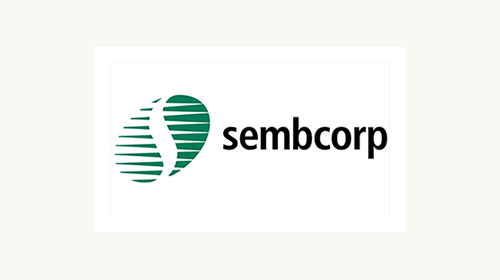
Working with Sembcorp on developing its climate change strategy
We provided an assessment of material climate change risks and opportunities, now and in the short-to-medium term future. ERM helped raise internal awareness around those risks and opportunities so that corporate and business unit management recognized and accepted the business case for action. The team identified strategic options and priority actions to address risks and opportunities, utilizing existing capabilities while developing new initiatives within Sembcorp.
The complexities of transitioning to a lower-emissions economy also present significant environmental and social challenges. For example, we are working with companies to develop more sustainable methods of mining to meet market demands for mineral and metal inputs that are integral to lower-emissions technology, from electric car batteries to wind turbines and solar panels.
Businesses increasingly understand that they need to take new approaches to address climate change impacts. They are signing up for leadership initiatives such as Science Based Targets, We Are Still In and RE100, and need to determine how to deliver on their commitments. ERM helps companies do this by assessing their readiness; conducting scenario, risk and opportunity analyses; satisfying stakeholders with regulated and voluntary disclosures; and creating value and mitigating risk across their asset base, value chain and business portfolio mix.
ERM provides technical expertise to enable clients to think more broadly about corporate strategy and anticipate the future. We understand how technical issues and societal challenges and impacts fit into a broader business agenda. Globally, ERM provides climate change strategy and associated risk assessment and risk management support to clients with broad portfolios across different sectors.
Building resilience in a lower-emissions future
To build resilience to climate change and prepare for a lower-emissions future, ERM is helping organizations develop both mitigation strategies and adaptation response plans.

Emissions reductions validation for the Dow Chemical Company and the International Olympics Committee (IOC) Carbon Partnership
Since September 2017, Dow has been the Official Carbon Partner of the International Olympic Committee, as part of a global effort by the IOC to neutralize its carbon emissions. The partnership, which runs through to 2020, has the goal to deliver third-party-verified greenhouse gas (GHG) emissions reductions derived from innovative production processes and products developed by Dow in many different geographies. It builds on successful carbon mitigation programs implemented by Dow and the Organizing Committees of the Olympic Games Sochi 2014 and Rio 2016, and significantly extends the program's reach and influence to a global scale. With the program, Dow is harnessing the market penetration of new technologies and products contributing to the development of a low carbon and more efficient economy.
Moving to cleaner and renewable energy sources
Renewable energy sources are part of the mix in moving to a lower-emissions future. ERM is involved in a range of wind energy projects where we combine technical expertise with an understanding of the wind energy development process, local regulatory systems and stakeholder concerns with a strong appreciation of the commercial context of these developments. We understand that the development process consists of a number of key elements, from site selection, environmental studies, stakeholder engagement and permitting through construction, transmission and operation. Each of these steps is critical to the successful and commercial development of wind energy.
From former coal mine to wind energy
The project area encompasses over 15,000 acres of previously or currently mined land. ERM led the environmental survey and permitting aspects of the project including wetland, cultural resources, bat habitat, noise and visual field studies. We provided expert witness testimony to the West Virginia Public Service Commission regarding our work, and the project was approved by the Public Service Commission in 2017. The project is expected to begin construction in 2019 and become operational in early 2021.
Forefront of reporting and disclosure
Mainstream investors increasingly are demanding transparency, and shareholders are demanding financial disclosure. As demand for transparency and disclosures increases, organizations can leverage sustainability reporting processes to drive improved business performance and value through a focus on material issues.
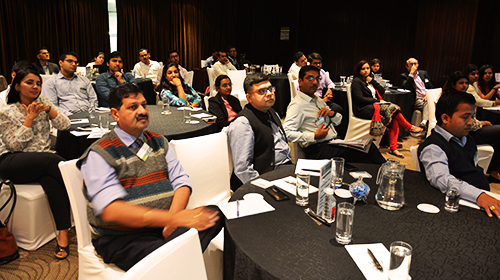
Demystifying Dow Jones Sustainability Indices (DJSI)
Facilitated by subject matter experts from RobecoSAM and ERM, this interactive workshop, “Demystifying Dow Jones Sustainability Indices (DJSI),” focused on sharing conceptual insights and industry-wide best practices that are critical to a business’ long-term sustainability performance. The key benefits of the workshop included:
- Increased knowledge about the methodology behind DJSI and RobecoSAM’s Corporate Sustainability Assessment and scoring process;
- Conceptual deep-drives on selected criteria where organizations have scope for improvement: human rights, supply chain management, human capital development, and impact measurement and valuation;
- Improved understanding of financially material sustainability aspects and how investors utilize them in their investment decision-making;
- Industry-wide best practices in India – what your peers are doing to score better on the DJSI Index; and
- DJSI 2017 responses and emerging performance trends by Indian corporations.
ERM is supporting many leading companies in Asia, Europe and North America with their DJSI 2018 submissions.
The process of developing sustainability reports, inherently a cross-functional exercise, can help drive internal collaboration, innovation and improved decision-making. It becomes a tool to help organizations crystallize their sustainability approach within their business strategy, mitigate risks, improve sustainability and operational performance, strengthen internal management systems and improve relationships with key stakeholders.
ERM collaborates closely with leading international organizations, such as the World Business Council for Sustainable Development (WBCSD), Global Reporting Initiative (GRI), Sustainability Accounting Standards Board (SASB) and the Carbon Disclosure Project (CDP), to help shape and bring insights to global standards for reporting and disclosure around carbon.
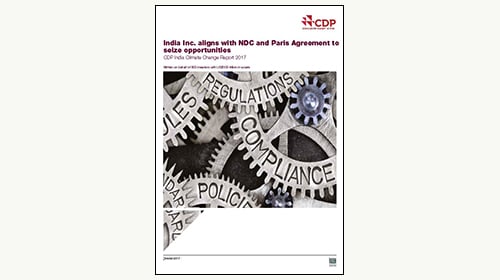
ERM co-authors CDP India report
In 2017, 51 Indian companies responded to the CDP Climate Change questionnaire, of which 43 were among the Bombay Stock Exchange Top 200 companies and 3 from other benchmark samples to whom CDP India had sent information requests. In addition, another five self-selected companies came forward on their own volition to disclose their climate impact to CDP. Fifty-one companies reported total emissions of 275.92 million tons of carbon dioxide equivalents.
CDP India and ERM launched the report at the Bombay Stock Exchange in October 2017. ERM works with many other clients around the world with CDP reporting.
1. Breaking the tragedy of the horizon - climate change and financial stability, speech by Mark Carney given at Lloyds of London, January 2015: https://www.bankofengland.co.uk/speech/2015/breaking-the-tragedy-of-the-horizon-climate-change-and-financial-stability
